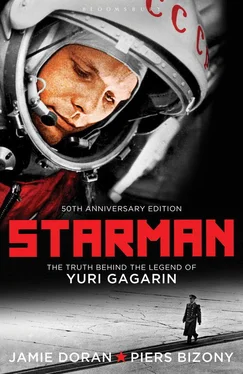Valentin picked Anna up near the old electrical sub-station. They had fifteen minutes before the Moscow train was due to leave. As they approached the station there was some confusion with a local motorbike policeman, who wanted to know why Valentin was in such a tearing hurry. When it transpired that he had the First Cosmonaut’s mother in his truck, things went more smoothly. The train was already pulling away from the platform, but the stationmaster quickly put out a signal to stop it. ‘Mother got aboard, and the ticket officer ran into the carriage also, because in her distraction she’d forgotten to collect her change.’
His nerves thoroughly rattled, Valentin now had to go straight away to the district Party office, because there were many phone calls to answer.
For his part, Yuri’s father Alexei Gagarin had left the house very early that morning. There was a job on at the collective farm near Klushino, their old home village. He was contentedly going about his business when another farm worker came up to him and started asking strange questions about his son Yuri. ‘What’s it to you?’ Alexei demanded warily. [4] Golovanov, Our Gagarin , pp. 146–7.
‘Didn’t you hear? On the radio they said that Major Gagarin is flying in space.’
‘No, my son’s only a Senior Lieutenant. Still, good luck to our namesake, eh?’
All the same, it was a strange coincidence. Alexei thought he might just stroll over to the local Soviet (elected council), for a few minutes and see what was what. When he arrived and popped his head round the door, he found the place crowded and noisy. Local Soviet chairman Vasily Biryukov was busy on the telephone, talking to a district Party official in Gzhatsk. The official was saying, ‘We must find out where the cosmonaut was born. Is he in your village records?’
‘I don’t need any records!’ Biryukov shouted excitedly, ‘I’ve got his dad in the room with me! Here, I’ll give him the line.’ [5] Ibid., pp. 146–7.
Startled, unprepared, Alexei took the receiver. Now that he understood what was going on, he was too emotional to speak.
The Gzhatsk officials wanted Alexei to come there straight away, but Gzhatsk and Klushino were completely cut off from each other just now. The spring floods had swept away all the roads. Alexei’s lame leg and general health made it difficult for him to walk too far, so Biryukov organized transport by horse over the wettest mud. Then they sat him on the back of a tractor and made a short-cut over the fields, leaving out the drowned roads altogether. One way and another his proud companions got Alexei back to Gzhatsk, where he joined Valentin and Boris in the local Party office, answering a seemingly endless stream of phone calls.
Valentin remembers, ‘Each of us was given an office and a phone. A secretary of the Regional Soviet asked, ‘For God’s sake, can you answer questions about biography? We can’t cope with the incoming calls. You see, people will be asking questions that only you can answer.’ My brother Boris and I sat down by our phones, and they rang endlessly. There were calls from Moscow, Leningrad, Kiev, Vladivostok and many other towns I’d never even heard of. There were calls from abroad, too. The democratic countries – Romania, Poland, Hungary, all of these.’ The switchboard operators had to ration the calls to two or three minutes each. ‘At two o’clock the television people came. The district Soviet building was buzzing all day like a disturbed beehive.’
Until this moment, nobody in the world had heard of Yuri Alexeyevich Gagarin, farmboy pilot from the Smolensk region.
As Zoya recalls, ‘Of course there was no rest for us. The journalists came from everywhere.’ They certainly did. A crowd of journalists with cameras and tape-recorders arrived seemingly out of nowhere. They tried to reach Gzhatsk in Volga cars, Chaikas and Zils, but the rough roads around the town were good only for tractors because of the recent spring floods. The Moscow correspondents had to stop several hundred metres away from the Gagarins’ house, then trudge in their city shoes through the mud. Some well-equipped camera crews arrived by helicopter, avoiding the roads altogether. That morning Anna had thrown open the windows of the house to let in the fresh spring air. This was a mistake. A few of the journalists knocked politely on the door and asked to be invited inside, but others clambered in through the windows. Suddenly the house was full of journalists rifling through the Gagarins’ every possession, touching, probing, getting things out of place. They were very efficient, almost as intrusive as the KGB, and barely more polite. They asked if any private family photographs might be available and promised to bring them back safely, but they never returned a single one. ‘After that, we had no peace,’ Zoya says. ‘We had telephone calls from everywhere. They all wanted to find out who Yuri was, and where he came from. They didn’t know!’
Of course a private telephone was not available to the Gagarins. The only available handsets were in the nearby Soviet community hall, where Alexei and Valentin were busy fielding calls. One of these, later in the day, was from Yuri himself to say that he was all right. Anna had a chance to speak with him that evening, after she’d arrived in Moscow, ‘but of course we couldn’t quite believe that everything was all right until we could actually see him,’ Zoya says. ‘You know, we Russians have a saying. You have to touch it to believe it.’
Most published accounts state that Gagarin’s descent to earth went smoothly, without serious incident. Gagarin himself was always careful to support this version of events. His official account of the flight, The Road to the Stars , contains only a hint of trouble, so fleeting that it was entirely overlooked by Western experts:
The braking rockets turned on automatically… I ceased being weightless, and the growing g-loads pressed me into my seat. These grew and grew, and were heavier than at take-off. The craft began to revolve and I told ground control about it. The turning I had worried about soon stopped and the descent went on normally. [6] Ibid., pp. 149–50.
The turning I had worried about … The only opportunity Gagarin had to tell the truth, formally at least, was when he testified to a special State Committee, headed as always by Korolev, Kamanin and Keldysh. This meeting was a private opportunity for the cosmonaut to report candidly on Vostok’s overall engineering performance during the flight. It was not considered appropriate to release any sensitive technical details to outsiders. Certainly there was no need for Gagarin to tell the world that he could have been killed.
Just before re-entry the ball’s main linkages with the rear equipment module separated correctly, but the umbilical cable, with its dense bundle of electrical wires that transferred power and data to the ball, did not come away cleanly. For several minutes the ball and the rear module remained tied together, like a pair of boots with their laces inadvertently knotted. The whole ensemble tumbled end over end in its headlong rush to earth.
The ball was weighted with a special bias, so that the thicker layer of heat shielding at Gagarin’s back would swing round naturally of its own accord to face the super-hot onrush of the earth’s atmosphere. With the equipment module corrupting the air flow and distorting the proper mass distribution, this alignment was no longer possible. ‘The craft began to rotate rapidly. I was like an entire corps de ballet ,’ Gagarin reported to the secret State Committee. ‘I waited for the separation but there wasn’t any. When the braking rocket shut down, all the indicator lights on the console went out. Then they lit up again. There was no separation whatever. I decided that something was wrong. The craft’s rotation was beginning to slow, but it was about all three axes, ninety degrees to the right, to the left… I felt the oscillations of the craft and the burning of the coating. I don’t know where the sound of crackling was coming from. Either the structure was cracking, or the thermal cladding was expanding as it heated, but it was audibly crackling. I felt the temperature was getting high.’ [7] Joint Publications Research Service-USP-91–004, September 20, 1991, pp. 71–7; Belyanov, ‘Tomorrow…’ See also: Broad, William J., ‘The Untold Perils of the First Manned Spaceflight’, The New York Times , March 5, 1996.
Читать дальше












